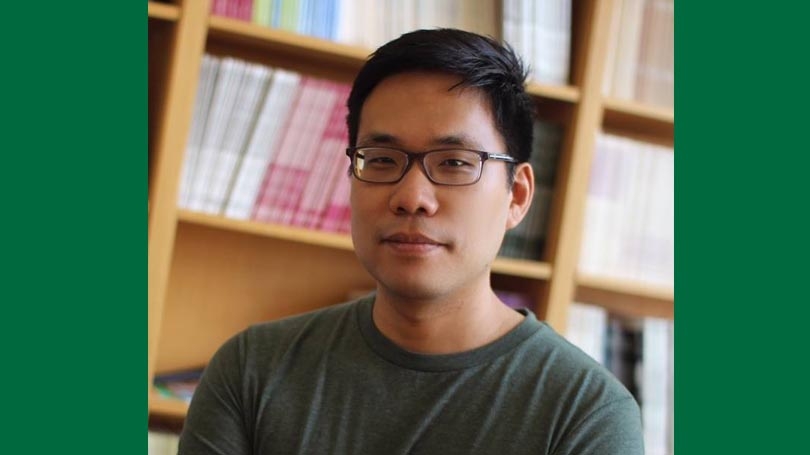
Justin Kim, PhD '17 Psychological and Brain Sciences, is the 2017 recipient of the Hannah T. Croasdale Scholar Award
The Hannah T. Croasdale Scholar Award is presented to the graduating Ph.D. recipient who best exemplifies the qualities of a scholar. This individual possesses personal qualities of intellectual curiosity, dedication, and commitment to the pursuit of new knowledge, and to teaching. The award honors Professor Hannah T. Croasdale who performed research and taught biology for more than 40 years at Dartmouth. She was the first woman at Dartmouth to achieve the level of full professor.
As one might imagine, the selection process for the Croasdale award recipient is not an easy one. With the standard of research and caliber of student in each graduating class being among the very highest, how then, are we to choose only one worthy of this award? Who stands above the rest, and what are the qualities that put them into a category of their own? In this year's recipient, all of this was very apparent.
Justin Kim completed his B.A. in Psychology, Summa Cum Laude, at the Seoul National University, Korea, going on to receive an M.A. in Clinical Psychology at the same institution. He joined the Department of Psychological and Brain Sciences at Dartmouth in 2006, working under his advisor Paul Whalen.
For those of you doing the math, yes, that was 10 years ago. While ten years might be on the longer side of time taken to complete the PhD, it wasn't a lack of preparation that brings Justin to the ceremony today, but rather a three-year stint of mandatory military service. Justin took a leave of absence during which time he served as a lecturer and then assistant professor in the Department of Psychology in the Korean Military Academy.
His research at Dartmouth has produced more than 30 papers that have been published in prestigious journals in the neuroscience field. His work has been cited more than 2000 times, resulting in an H-index of 16. His work on prefrontal-amygdala circuitry has already been replicated by numerous laboratories and offers the field tangible evidence that can inform treatments for individuals suffering from anxiety disorders.
Justin has won numerous awards, and his graduate work was notably funded by his own NRSA grant from the NIH. His research is already highly regarded in the field, evidenced by the numerous invitations he has received to present at conferences and departmental colloquia. In 2015 he was awarded the Trainee Professional Development Award to present his research at the 2015 Society for Neuroscience conference.
Justin's contribution to the field is significant because of the impact his work is already making, but also because of his commitment to teaching and service and the inspiration he generates among his peers. Justin's contribution to the training of the undergraduate research assistants in the Whalen lab was integral to their success. All five are currently in the field and attribute their achievements to Justin's influence. His graduate peers speak highly of his dedication to the learning process, to enriching the field not only with stellar research, but by seeing the value in bringing the best out in others. 2015 Croasdale recipient and current Assistant Professor at UCLA Carolyn Parkinson, notes "Justin was a natural role model. He was highly productive in his own work while still being incredibly generous with his time and energy when helping others."
Justin is now a postdoctoral researcher at Duke University in one of the leading neuroscience laboratories in the field. His Dartmouth advisor, Paul Whalen says "I could not be prouder of Justin and consider myself lucky to have had a front row seat as he found his place in this field. Justin is successful because he does not think of his efforts as a means to an end. He has the natural love of discovery necessary for an academic career."
Justin Kim is a very worthy recipient of the 2017 Hannah T. Croasdale Award. Congratulations, Justin!